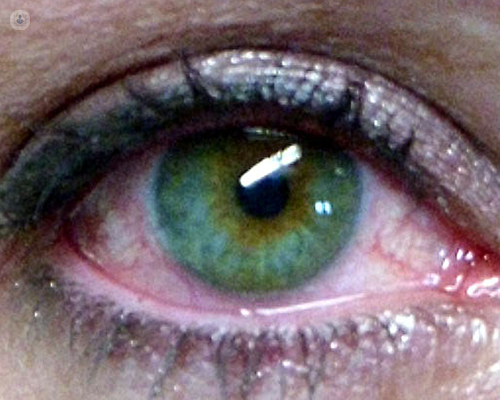

Watery eyes, also known as epiphora, is a condition where there is an overflow of tears onto the face. It is very common and can develop at any age, although it is more common in babies and people over the age of 60. It may affect one or both eyes and usually manages to get better without any treatment or, if need be, it can easily and effectively be treated.

What causes watery eyes?
The causes of watery eyes are:
- Blocked tear ducts
- Some people are born with underdeveloped tear ducts and it is normal for newborn babies to have watering eyes, which clear up as the ducts develop. In adults and older children, the most common cause is blocked ducts or ducts that are too narrow. Narrowed ducts are a result of swelling or inflammation. If the tear ducts are blocked, the tears will build-up and not be able to drain. The build-up of tears in the tear sac increases the risk of an infection, meaning the eye will produce a sticky liquid.
- Overproduction of tears
- Eyes that become irritated may produce more tears than normal. The eyes can become irritated by a number of factors, including; some chemicals, such as fumes, infective or allergic conjunctivitis, an injury to the eyes, such as a scratch or from grit, from the eyelashes growing inward or to the lower eyelid turning outward.
- Other causes
- Watering eyes can result from an infection of the cornea (keratitis), an open sore on the front surface of the eye (corneal ulcer), styes, Bell’s palsy, dry eyes, allergies such as hay fever and the use of certain medications due to the preservatives as an ingredient. .
Treatment of watery eyes
In mild cases of watery eyes, the doctor may recommend ocular lubricants in the form of dry eye drops and monitor progress. Depending on the cause of watering eyes, there are different treatment options. For watery eyes caused by an irritation, if it does not clear up by itself then a course of antibiotics may be necessary. For blocked tear ducts, surgery may be required to create a new channel between the tear sacs to the inside of the nose. The surgical procedure is called dacryocystorhinostomy (DCR).
Home remedies for watering eyes
It is recommended to take a break from reading, computer or phone screens. Most dry eye drops are available to purchase over the counter at a pharmacy to keep the eyes lubricated. Holding a warm, damp cloth over the eyes may help to release any blockages also. Cleansing the eyelids with lid wipes or a saline solution can also help alleviate symptoms of dry eyes if linked with blepharitis.
